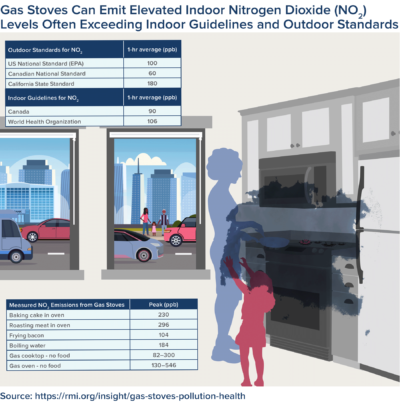Many Americans depend on, and oftentimes prefer, using gas appliances for heating and cooking in their homes. What many don’t realize is the negative impact burning fossil fuels in your home has on the climate and human health and how well alternatives like heat pumps, heat pump water heaters, and induction cooktops can perform.
The Health Effects from Gas Stoves Pollution recent study by the Rocky Mountain Institute (RMI) found that gas stoves, particularly when unvented, can be a primary source of indoor air pollution, often exacerbating respiratory conditions like asthma. With indoor air pollution being largely unregulated, RMI put forth immediate recommendations to help mitigate the associated health risks
Over 40 years of evidence indicates that gas stoves can lead to unhealthy levels of indoor air pollution. The report outlines eight key points:

- Indoor air is largely unregulated and is often more polluted than outdoor air.
- Gas stoves can be a large source of toxic pollutants indoors.
- Indoor pollution from gas stoves can reach levels that would be illegal outdoors.
- There are well-documented risks to respiratory health from gas stove pollution.
- Children are particularly at risk of respiratory illnesses associated with gas stove pollution.
- Lower-income households may be at higher risk of gas stove pollution exposure.
- Ventilation is critical but is not the sole strategy to prevent exposure.
- Electric cooking is a cleaner household cooking option.
What can you do to immediately mitigate the health risks associated with gas stoves?
- Open windows and use the exhaust (not recirculating) hood during cooking
- Install a low-level carbon monoxide detector
- Use a plug-in induction cooktop
- Switch out a gas stove for an electric stove
Most building science professionals and sustainability researchers recommend moving away from fossil fuels in the home as part of a wider “electrify everything” movement that recognizes both the safety and carbon footprint benefits of new technologies.
Interested in learning how your home is impacted? Schedule a visit with one of Viridiant’s building science experts to perform safety tests of gas appliances, including stoves, and to evaluate the effectiveness of your home’s ventilation system.
Click here to learn more about Viridiant’s services for your home, including in-home inspections, solar consulting, and now remote energy audits.
Contact: Andrew Grigsby, Energy Services Director, andrew.grigsby@viridiant.org
